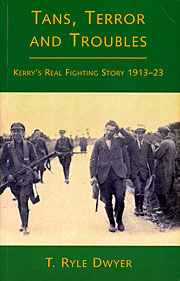
What happened in
Kerry during the War of Independence and the Civil War
has been the subject of controversy. Although Eoin O' Duffy - chief of
staff of
the Free State army - said
that 'Kerry's entire record in the Black and Tan struggle consisted in shooting
an unfortunate soldier the day of the Truce', some of the earliest operations
of the War of Independence took place there
or involved Kerrymen. The guns for the planned national uprising of 1916
were supposed to be landed in Kerry,
and Roger Casement was arrested there
on
Good Friday 1916. Moreover, although Eamon de Valera is usually
described as the last commandant to have
surrendered during the Easter Rising
and
the only one not to have been executed afterwards, a Kerryman, Thomas
Ashe, also survived and was, in fact, the last
commandant to lay down his arms
- and the only one to achieve his
military objective.
For nine days in November 1920, Tralee was shut down
by the Crown forceps. Shops, factories and schools were closed, the two local
newspapers ceased
operating, and those who
ventured out risked being killed in the streets. A
visiting French journalist described Tralee as being more terrorised
than any
town he had seen in France
during the First World War. Kerry was also the scene of terrible atrocities
during the Civil War. This may explain why the county's experience of the
conflict is still so little known: the survivors were
more interested in getting on with their lives than in perpetuating the
memories of the horrors that had been committed.
Since
Kerry's Fighting Story
was published by the Kerryman
in
1947, no
attempt has been made to cover
the period of the War of Independence and
the subsequent Troubles in the county. Unfortunately, that book was a
rushed
production and did not touch on the events of
the Civil War. Tans, Terror and Troubles,
told in a fast-paced and
readable style, gives the full story of events in Kerry during those dark days.
T. Ryle Dwyer
is a historian and
journalist. He has a PhD from the University
of North Texas and lives in Tralee, County Kerry. He has written many
books,
notably on the period of the War of
Independence
and the Civil War, and on Eamon
de Valera and
Michael Collins. His Short
Fellow: A Biography of
Charles J. Haughey
was published
by
Marino
Books in 1999.